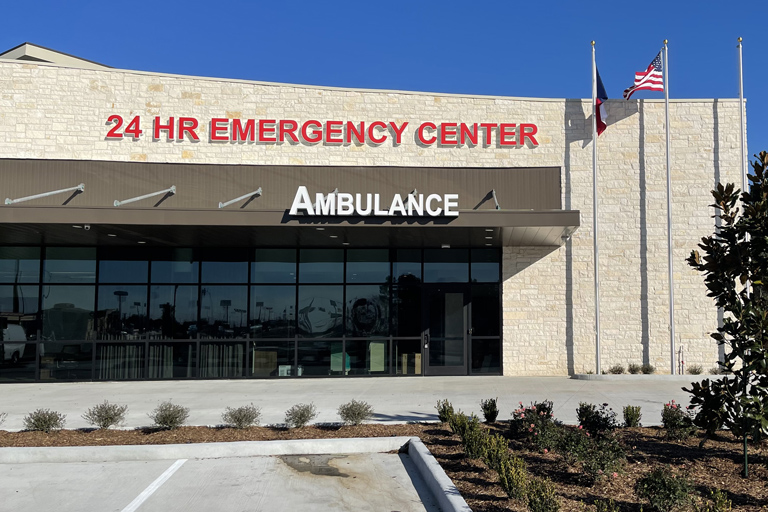ER vs Urgent Care
Yes. An ER facility is different from an urgent care facility in several ways.
- An ER facility treats medical emergencies.
- The hours of operation tend to differ between an ER and an urgent care center.
- You will always see a physician at an ER, while at an urgent care, you may be treated by a physician's assistant or nurse practitioner.
- Each type of facility charges services at different rates.
An emergency room accepts and treats patients 24 hours a day, 7 days a week, 365 days a year. Many urgent cares offer limited hours and days of service, often closing at night and on holidays.

Yes. An ER facility is different from an urgent care facility in several ways.
- An ER facility treats medical emergencies.
- The hours of operation tend to differ between an ER and an urgent care center.
- You will always see a physician at an ER, while at an urgent care, you may be treated by a physician's assistant or nurse practitioner.
- Each type of facility charges services at different rates.
An emergency room accepts and treats patients 24 hours a day, 7 days a week, 365 days a year. Many urgent cares offer limited hours and days of service, often closing at night and on holidays.
Hours of Operation
Emergency Room (ER)
24 hours a day, 7 days a week, 365 days a year
Urgent Care
Daytime and evening hours, weekends
- Broken bones
- Loss of consciousness
- Seizures
- Chest pain, shortness of breath, or tingling arm
- Head injuries and stroke signaled by a sudden inability to speak or understand speech
- Severe bleeding
- Stiff neck, nausea, fever, and splotchy skin
- Severe abdominal pain, especially on the lower right side, vomiting, and inability to pass gas
- An infant with a fever
- Sore throats
- Stuffy noses
- Sprains and strains
- Ear pain
- Fever without rash
- Headache or chills
- Minor wounds or cuts
Treatment at an urgent care center tends to cost less than treatment in an emergency room. Urgent care facilities have less overhead in terms of staffing, equipment, and supplies.
Both freestanding ERs and urgent cares provide billing specialists to help generate insurance claims and act on behalf of patients.
- If your symptoms become worse rapidly, such as sudden excruciating headache or blood in your urine or stool, you should visit the emergency room instead of urgent care.
- The time of day may be a factor. If you have an issue in the middle of the night that you feel cannot wait until an urgent care is open, the emergency room is always an option.
- If your condition is relatively minor, such as an earache or sore throat, you and your insurance will pay less at an urgent care center.
- Either facility is a good choice if you need treatment outside your primary care provider’s office hours, and both generally offer shorter wait times than a hospital ER. However, you may be limited to specific urgent care facilities by your insurance. Emergency rooms are all treated as in-network by major insurance carriers.
- Broken bones
- Loss of consciousness
- Seizures
- Chest pain, shortness of breath, or tingling arm
- Head injuries and stroke signaled by a sudden inability to speak or understand speech
- Severe bleeding
- Stiff neck, nausea, fever, and splotchy skin
- Severe abdominal pain, especially on the lower right side, vomiting, and inability to pass gas
- An infant with a fever
- Sore throats
- Stuffy noses
- Sprains and strains
- Ear pain
- Fever without rash
- Headache or chills
- Minor wounds or cuts
An urgent care may not have the capability to handle serious emergencies, nor have transportation agreements with local ambulance services. Also, an urgent care may not have the capacity to monitor a patient who needs to stay past regular business hours.
Both freestanding ERs and urgent cares provide billing specialists to help generate insurance claims and act on behalf of patients.
- If your symptoms become worse rapidly, such as sudden excruciating headache or blood in your urine or stool, you should visit the emergency room instead of urgent care.
- The time of day may be a factor. If you have an issue in the middle of the night that you feel cannot wait until an urgent care is open, the emergency room is always an option.
- If your condition is relatively minor, such as an earache or sore throat, you and your insurance will pay less at an urgent care center.
- Either facility is a good choice if you need treatment outside your primary care provider’s office hours, and both generally offer shorter wait times than a hospital ER. However, you may be limited to specific urgent care facilities by your insurance. Emergency rooms are all treated as in-network by major insurance carriers.
An emergency room is set up to handle medical emergencies, including:

- Broken bones
- Loss of consciousness
- Seizures
- Chest pain, shortness of breath, or tingling arm
- Head injuries and stroke signaled by a sudden inability to speak or understand speech
- Severe bleeding
- Stiff neck, nausea, fever, and splotchy skin
- Severe abdominal pain, especially on the lower right side, vomiting, and inability to pass gas
- An infant with a fever
Also, a freestanding ER can treat the minor symptoms just like an urgent care, so you don’t need to worry if an urgent care facility is unavailable. An urgent care facility is set up to handle minor issues such as:
- Sore throats
- Stuffy noses
- Sprains and strains
- Ear pain
- Fever without rash
- Headache or chills
- Minor wounds or cuts
Patients often select urgent care when they don’t want to wait to see their primary care physician.

A freestanding ER negotiates with local ambulance services and hospitals to provide transportation of patients in need of inpatient care, surgery, or other complex and ongoing treatment.
An urgent care may not have the capability to handle serious emergencies, nor have transportation agreements with local ambulance services. Also, an urgent care may not have the capacity to monitor a patient who needs to stay past regular business hours.

Treatment at an urgent care center tends to cost less than treatment in an emergency room. Urgent care facilities have less overhead in terms of staffing, equipment, and supplies.
Both freestanding ERs and urgent cares provide billing specialists to help generate insurance claims and act on behalf of patients.

- If your symptoms become worse rapidly, such as sudden excruciating headache or blood in your urine or stool, you should visit the emergency room instead of urgent care.
- The time of day may be a factor. If you have an issue in the middle of the night that you feel cannot wait until an urgent care is open, the emergency room is always an option.
- If your condition is relatively minor, such as an earache or sore throat, you and your insurance will pay less at an urgent care center.
- Either facility is a good choice if you need treatment outside your primary care provider’s office hours, and both generally offer shorter wait times than a hospital ER. However, you may be limited to specific urgent care facilities by your insurance. Emergency rooms are all treated as in-network by major insurance carriers.
Why Choose Family First?
Family First ER provides emergency services you need at the time you need them.
We offer a full range of diagnostic testing and experienced medical staff to ensure that you and your family have an excellent healthcare experience.

On-Site Lab & Imaging
With an on-site lab and top tier imaging equipment (CT, Ultrasound, & X-ray), we are a diagnostic powerhouse.

Work with all Commercial Insurance
If you are not fully covered, we’ll work with you and your provider to keep out of pocket costs minimal.

Open 24/7
Family First ER is a 24 hour clinic, open 365 days a year. Our tireless nurses and physicians are always at the ready.

Pediatrics
Your kids are your pride and joy. Our pediatrics department is ours, outfitted with the best.

VIP Treatment
Built with luxury & comfort in mind, Family First strives to make every patient’s stay with us a memorable one.

Little Wait Time
We are your partner for health, helping your live well by bringing the best in medicine and healthcare to your door.
You are welcome here
No Appointment Needed
We’re always open and always prepared to treat you and your loved ones – no appointments necessary. Simply walk in and you’ll be seen.

Licensed Professionals
Our emergency physicians and nurses offer the highest-quality care you can find. They’re licensed, board-certified, and have decades of combined experience.
Cost Effective
We’re committed to keeping healthcare as affordable as possible. Has insurance denied your claim? We’ll file an appeal on your behalf.
If you are in need of emergency services, please call us at (555) 555-5555
Contact us to inquire about our facility or services
We will contact you as soon as possible.


